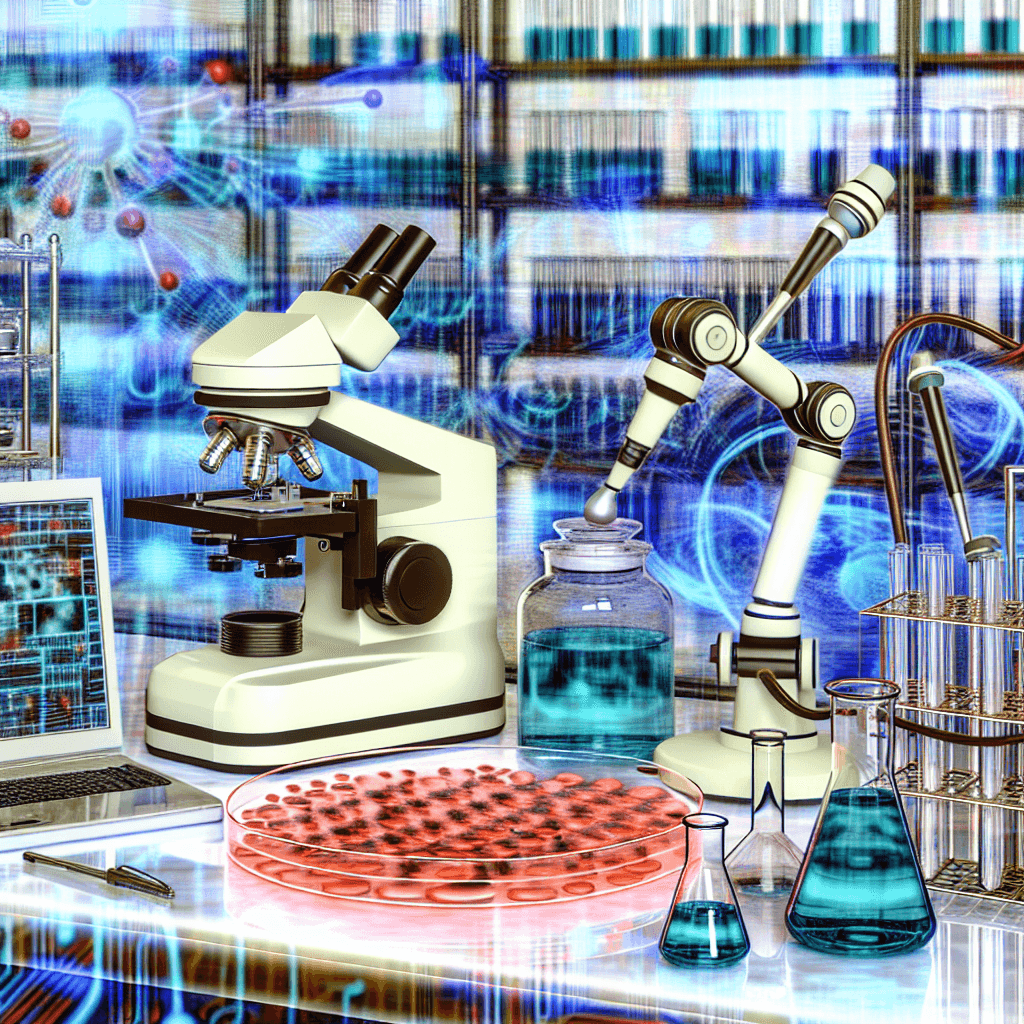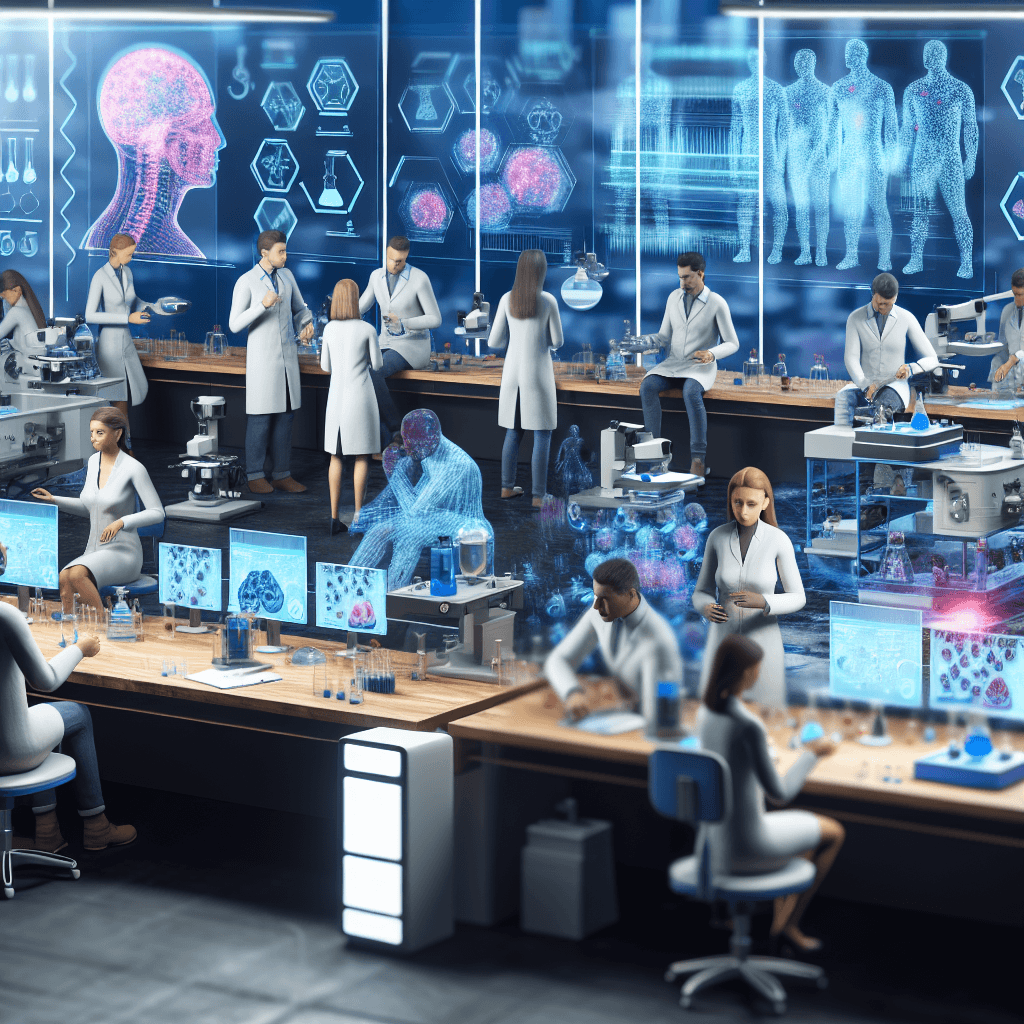Discover how AI is revolutionizing life sciences research processes, from drug discovery to data analysis, and its potential for future advancements.
The Impact of AI on Life Sciences Research Processes

Table of Contents
“Revolutionizing research with the power of AI: unlocking new discoveries and advancements in life sciences.”
Introduction
Artificial intelligence (AI) has revolutionized many industries, and the life sciences research field is no exception. With its ability to analyze vast amounts of data, identify patterns, and make predictions, AI has significantly impacted the way research is conducted in the life sciences. From drug discovery to disease diagnosis, AI has the potential to accelerate and improve various processes in life sciences research. In this essay, we will explore the impact of AI on life sciences research processes and its potential to drive innovation and advancements in the field.
The Role of AI in Drug Discovery and Development
The field of life sciences research has been revolutionized by the advancements in artificial intelligence (AI) technology. AI has become an integral part of drug discovery and development processes, offering a wide range of benefits and opportunities for researchers. In this article, we will explore the role of AI in drug discovery and development and its impact on the overall life sciences research processes.
One of the key areas where AI has made a significant impact is in the early stages of drug discovery. Traditionally, drug discovery involved a lengthy and expensive process of trial and error, with researchers testing thousands of compounds to find a potential drug candidate. However, with the help of AI, this process has become more efficient and cost-effective.
AI algorithms can analyze vast amounts of data and identify patterns that humans may not be able to detect. This allows researchers to narrow down the list of potential drug candidates, saving time and resources. Moreover, AI can also predict the efficacy and safety of these candidates, reducing the risk of failure in later stages of drug development.
In addition to speeding up the drug discovery process, AI also plays a crucial role in drug development. Once a potential drug candidate has been identified, it goes through a series of tests and trials to determine its safety and effectiveness. AI can assist in this process by analyzing data from clinical trials and predicting the outcomes of these trials.
This predictive capability of AI can help researchers make informed decisions about which drug candidates to move forward with, ultimately reducing the time and cost of drug development. Furthermore, AI can also help identify potential side effects and drug interactions, allowing researchers to address these issues before the drug is released to the market.
Another significant impact of AI on drug development is its ability to personalize treatments. With the help of AI, researchers can analyze a patient’s genetic makeup and medical history to determine the most effective treatment for their specific condition. This personalized approach to medicine has the potential to improve patient outcomes and reduce the risk of adverse reactions.
Moreover, AI can also assist in the optimization of drug dosages. By analyzing data from clinical trials and patient responses, AI algorithms can determine the optimal dosage for a particular drug, reducing the risk of under or over-medication.
Apart from its role in drug discovery and development, AI also has a significant impact on the overall life sciences research processes. With the help of AI, researchers can analyze vast amounts of data from various sources, including scientific literature, clinical trials, and patient records. This allows for a more comprehensive understanding of diseases and potential treatments.
Furthermore, AI can also assist in the identification of new drug targets. By analyzing genetic data and disease pathways, AI algorithms can identify potential targets for drug development, opening up new avenues for research and discovery.
In conclusion, the role of AI in drug discovery and development is undeniable. It has transformed the traditional methods of research and has the potential to revolutionize the field of life sciences. With its ability to analyze vast amounts of data, predict outcomes, and personalize treatments, AI has the potential to improve patient outcomes and reduce the time and cost of drug development. As AI technology continues to advance, we can expect to see even more significant impacts on the life sciences research processes in the future.
Enhancing Precision Medicine with Artificial Intelligence

Artificial intelligence (AI) has been making waves in various industries, and the life sciences sector is no exception. With its ability to analyze vast amounts of data and make predictions, AI has the potential to revolutionize the way we approach research and development in the field of life sciences. In particular, AI has shown great promise in enhancing precision medicine, a rapidly growing field that aims to provide personalized treatments for patients based on their unique genetic makeup and medical history.
One of the key challenges in precision medicine is the sheer amount of data that needs to be analyzed. With the human genome consisting of over 3 billion base pairs, and each individual having their own unique genetic variations, it is a daunting task for researchers to manually sift through this data to identify potential treatments. This is where AI comes in, with its ability to quickly and accurately analyze large datasets, it can help researchers identify patterns and correlations that would have been impossible to detect manually.
AI can also assist in the identification of potential drug targets. By analyzing genetic data and disease pathways, AI algorithms can pinpoint specific genes or proteins that may be responsible for a particular disease. This not only speeds up the drug discovery process but also increases the chances of finding effective treatments. In fact, a recent study by researchers at Stanford University found that AI was able to identify potential drug targets for Alzheimer’s disease that had been missed by traditional methods.
In addition to drug discovery, AI can also play a crucial role in clinical trials. By analyzing patient data, AI algorithms can identify which patients are most likely to respond positively to a particular treatment, allowing for more targeted and efficient clinical trials. This not only saves time and resources but also increases the chances of success in these trials.
Another area where AI is making a significant impact is in the field of medical imaging. With the advancement of technology, medical imaging has become an essential tool in diagnosing and monitoring diseases. However, the interpretation of these images can be subjective and prone to human error. AI algorithms, on the other hand, can analyze medical images with a level of precision and accuracy that is unmatched by humans. This can lead to earlier and more accurate diagnoses, ultimately improving patient outcomes.
Moreover, AI can also assist in the development of personalized treatment plans for patients. By analyzing a patient’s medical history, genetic data, and other relevant factors, AI algorithms can predict how a patient may respond to different treatments. This allows for a more tailored approach to treatment, taking into account individual variations and increasing the chances of success.
However, as with any new technology, there are also challenges and concerns surrounding the use of AI in life sciences research. One of the main concerns is the potential bias in the data used to train AI algorithms. If the data used is not diverse enough, it can lead to biased results, which can have serious implications in precision medicine. To address this issue, researchers must ensure that the data used to train AI algorithms is representative of the population it is intended to serve.
In conclusion, AI has the potential to greatly enhance precision medicine and revolutionize the way we approach life sciences research. From drug discovery to clinical trials and personalized treatment plans, AI can assist at every stage of the research process. However, it is crucial that we continue to address any potential biases and ethical concerns to ensure that AI is used responsibly and for the benefit of all. With further advancements and collaborations between AI and life sciences, the future of precision medicine looks promising.
Revolutionizing Clinical Trials with Machine Learning
The field of life sciences research has been rapidly evolving with the advancements in technology, particularly in the area of artificial intelligence (AI). AI has the potential to revolutionize the way clinical trials are conducted, making the process more efficient, accurate, and cost-effective. In this article, we will explore the impact of AI on life sciences research processes, specifically in the realm of clinical trials.
Traditionally, clinical trials have been a time-consuming and expensive process. It involves recruiting participants, collecting and analyzing data, and ensuring the safety and efficacy of the treatment being tested. However, with the integration of AI, these processes can be streamlined and optimized, ultimately leading to faster and more accurate results.
One of the key ways in which AI is revolutionizing clinical trials is through machine learning. Machine learning is a subset of AI that involves training algorithms to learn from data and make predictions or decisions without being explicitly programmed. In the context of clinical trials, machine learning can be used to analyze vast amounts of data and identify patterns that may not be apparent to human researchers.
One of the major challenges in clinical trials is patient recruitment. It can be a lengthy and costly process to find suitable participants who meet the specific criteria for a particular study. With machine learning, researchers can analyze large datasets of patient information and identify potential participants who fit the criteria. This not only saves time and resources but also ensures a more diverse and representative sample for the trial.
Another area where AI is making a significant impact is in data collection and analysis. In traditional clinical trials, data is collected through various methods such as surveys, interviews, and physical examinations. This data is then manually entered and analyzed by researchers, which can be a time-consuming and error-prone process. With AI, data can be collected and analyzed in real-time, providing researchers with immediate insights and reducing the risk of human error.
Moreover, AI can also assist in identifying potential adverse events or side effects of a treatment. By analyzing data from previous trials and patient records, AI algorithms can identify patterns and signals that may indicate a potential adverse event. This can help researchers to proactively address any safety concerns and make necessary adjustments to the treatment.
In addition to improving the efficiency and accuracy of clinical trials, AI also has the potential to reduce costs. With the use of AI, researchers can analyze data and make predictions about the success of a treatment, reducing the need for expensive and time-consuming trials. This can also lead to a more targeted approach to clinical trials, focusing on specific patient populations and reducing the number of participants needed.
However, as with any new technology, there are also challenges and limitations to consider. One of the main concerns with AI in clinical trials is the potential for bias. AI algorithms are only as unbiased as the data they are trained on, and if the data is biased, the results will be as well. Therefore, it is crucial for researchers to ensure that the data used to train AI algorithms is diverse and representative of the population being studied.
In conclusion, AI is revolutionizing the way clinical trials are conducted in the field of life sciences research. From patient recruitment to data collection and analysis, AI has the potential to make the process more efficient, accurate, and cost-effective. However, it is essential for researchers to address any potential biases and ensure the ethical use of AI in clinical trials. With continued advancements in AI technology, we can expect to see even more significant impacts on the field of life sciences research in the future.
AI-Powered Data Analysis for Faster and More Accurate Research Results
The field of life sciences research has been revolutionized by the advancements in artificial intelligence (AI) technology. With the ability to analyze vast amounts of data at a rapid pace, AI has become an invaluable tool for researchers in their quest to understand and improve various aspects of human health and well-being. In this article, we will explore the impact of AI on life sciences research processes, specifically focusing on its role in data analysis.
Traditionally, data analysis in life sciences research has been a time-consuming and labor-intensive process. Researchers would spend hours manually sorting through data, looking for patterns and correlations, and then interpreting the results. This process was not only tedious but also prone to human error. With the introduction of AI, this has all changed.
AI-powered data analysis has significantly reduced the time and effort required for data analysis in life sciences research. By using algorithms and machine learning techniques, AI can quickly sift through vast amounts of data, identifying patterns and relationships that may not be apparent to the human eye. This has allowed researchers to analyze data more comprehensively and efficiently, leading to faster and more accurate research results.
One of the most significant advantages of AI-powered data analysis is its ability to handle large and complex datasets. In life sciences research, data can come from a variety of sources, such as clinical trials, genetic sequencing, and electronic health records. These datasets can be massive and contain a vast amount of information, making it challenging to analyze manually. AI can handle these datasets with ease, allowing researchers to gain insights and make connections that would have been impossible to do manually.
Moreover, AI-powered data analysis has also improved the accuracy of research results. By eliminating the potential for human error, AI can provide more reliable and consistent results. This is especially crucial in the field of life sciences, where even the smallest mistake can have significant consequences. With AI, researchers can have confidence in their findings, leading to more robust and trustworthy research outcomes.
Another significant impact of AI on data analysis in life sciences research is its ability to identify new patterns and relationships. With its advanced algorithms, AI can uncover connections that may not have been apparent to researchers before. This has led to new discoveries and breakthroughs in various areas of life sciences, such as disease diagnosis, drug development, and personalized medicine. By analyzing data in a more comprehensive and unbiased manner, AI has opened up new avenues for research and has the potential to revolutionize the field of life sciences.
Furthermore, AI-powered data analysis has also improved the efficiency of research processes. With the ability to analyze data at a rapid pace, researchers can now complete tasks that would have taken months or even years in a matter of days. This has allowed for faster research progress and has enabled researchers to focus on more critical aspects of their work, such as data interpretation and hypothesis testing. As a result, research projects can be completed in a shorter time frame, leading to faster advancements in the field of life sciences.
In conclusion, AI-powered data analysis has had a significant impact on life sciences research processes. By reducing the time and effort required for data analysis, improving accuracy, identifying new patterns and relationships, and increasing efficiency, AI has become an essential tool for researchers. As AI technology continues to advance, we can expect to see even more significant contributions to the field of life sciences, leading to improved health outcomes and a better understanding of the world around us.
Q&A
1. How has AI impacted the speed of research processes in life sciences?
AI has significantly increased the speed of research processes in life sciences by automating tasks such as data analysis, drug discovery, and clinical trial design. This has allowed researchers to process and analyze large amounts of data in a fraction of the time it would take using traditional methods.
2. What are some potential benefits of using AI in life sciences research?
Some potential benefits of using AI in life sciences research include faster and more accurate data analysis, improved drug discovery and development, more efficient clinical trial design, and the ability to identify patterns and trends in large datasets that may not be visible to humans.
3. Are there any concerns about the use of AI in life sciences research?
Yes, there are some concerns about the use of AI in life sciences research, such as the potential for biased algorithms, lack of transparency in decision-making, and the need for ethical guidelines to ensure responsible use of AI in research.
4. How can AI be integrated into the research process in life sciences?
AI can be integrated into the research process in life sciences through various methods, such as using machine learning algorithms to analyze large datasets, using natural language processing to extract information from scientific literature, and using AI-powered robots for laboratory experiments. Additionally, AI can also be used to assist in clinical trial design and patient recruitment.
Conclusion
In conclusion, the impact of AI on life sciences research processes has been significant and continues to grow. AI technology has revolutionized the way data is collected, analyzed, and interpreted, leading to faster and more accurate results. It has also enabled researchers to tackle complex problems and make new discoveries that were previously impossible. However, there are also concerns about the ethical implications of AI in research and the potential for bias in data and decision-making. As AI continues to advance, it is crucial for researchers to carefully consider its use and ensure that it is used ethically and responsibly in order to fully harness its potential for the benefit of society.








